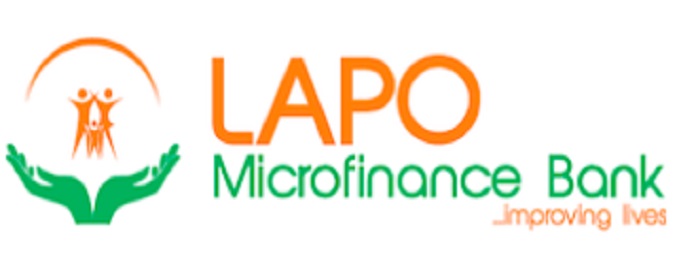By Paul K Adegboyega
Undoubtedly, 2021 – the second year of the Covid-19 pandemic – has been another tough year for many Nigerians especially low-income earners who have limited access to financial services.

It has also been a difficult year for the microfinance banks (MFBs) which serve this indigent category who have increased difficulty paying back loans since the pandemic started.
Many MFBs are facing serious challenges, some existential, that are threatening their bottom lines and very survival.
Therefore it is commendable to find a microfinance bank that is not only weathering the pandemic’s many disruptions, sustaining critical services to entrepreneurs and low-income earners but also maintaining the rigorous standards that it is well known for.
Within the first six months of 2021, LAPO, Nigeria’s largest MFB has distinguished itself through continued high performance while serving its millions of customers and also responding to the prevailing health and safety challenges.
As the year began, LAPO continued to prioritize the health and safety of its customers and staff through various initiatives including its intensive campaigns promoting pandemic awareness on social media platforms.
It will be recalled that in 2020 LAPO had taken many proactive measures in response to the pandemic.
For instance, it shut down its on-site operations on March 25 2020, ahead of the Federal Government’s own lockdown order and also paused interest payments on its loans for six weeks.
The institution also distributed food and other relief items across Nigeria, made donations to the Edo and Lagos State Governments to support their efforts in addressing the pandemic and sustained its own Covid-19 awareness campaigns on radio stations and online platforms even after resuming on-site operations.
With business activities picking up following the Christmas holidays and amidst great uncertainty about vaccination, new waves of infection, new variants of Covid-19, etc, LAPO also boosted its advocacy efforts to encourage customers and the public to keep taking precautions.
In addition to the usual difficulties of meeting obligations such as paying school fees, house and business rents etc at the beginning of the year, small and medium scale entrepreneurs also face the challenge of acquiring or updating critical business assets.
Therefore it was helpful that LAPO also began the year by promoting a slew of customer-friendly products to the public in the New Year.
Such products include LAPO’s Collateral-free Asset Loans which help people pay for Generators, Tricycles, Refrigerators, Pure Water Machines, Printing Machines and other items often needed by small businesses.
The adverts encouraged business owners to come forward even if the business assets they needed were not among those listed.
The bank also promoted a bouquet of educational loans including the School Fees Loans which provide N20,000 to N200,000 for parents with children in primary school and N50,000 to N500,000 for those with undergraduate wards.
These education loans were timely considering that many parents are finding it difficult to keep their children in school due to lay-offs, failing businesses and other economic hardships related to the pandemic.
LAPO also announced the School Improvement Loan through which it provides much-needed finance to proprietors of low to medium income nursery, primary and secondary schools to help them improve their facilities and equipment.
LAPO continues to offer access to microcredit through these and other unique products such as its My Pikin and I Loan, its Clean Energy Loans, SME Loans, among others.
As a testament to the importance of microcredit and a nod to LAPO’s reputation, the institution was cited by an Arise TV anchor during a February edition of The Morning Show which featured former Governor Peter Obi.
“How do we increase banks like LAPO to get people microcredit to do business?” said the anchor as he discussed economic matters with the former Governor.
On its own, the bank continues to increase access of underserved populations to microcredit as seen in its growing presence across the country.
By February, LAPO announced that it was available in 535 locations across 34 states through which it serves over three million customers.
Also in February, to lift the spirits of its numerous customers and encourage them morally to push through the difficulties of the pandemic, LAPO organised a nationwide celebration in which it gave gifts to customers to mark Valentine’s Day.
LAPO recorded more wins in March as it was awarded ‘The Most Supportive Bank’ national category in the Central Bank of Nigeria (CBN) Agricultural Credit Scheme Funds (ACGSF), evidence of its continual support of the Agricultural Sector.
The institution was also commended by the CBN for financing and producing the best farmer in 2020 under the ACGSF. LAPO joined the Agricultural Credit Guarantee Scheme Fund (ACGSF) in 2012 to provide credit support to farmers across the country in a sustainable manner. Since then it has disbursed over N27 Billion to over 34,000 farmers and agro-allied operators across Nigeria.
Following the award, LAPO sustained its momentum in March. In building on its culture of providing financial literacy to various key demographics, the institution embarked on campaigns to mark the 2021 Global Money Week from March 22 to 28 which raised awareness on the importance of ensuring that from a young age, people become financially literate and build good money habits.
In line with this focus, the institution made sensitization visits to various schools and also organized a webinar designed to train youths on Money Management, Saving Skills, and Career Development, among others.
As an institution LAPO remains an active promoter of good financial practices and a credible authority on financial inclusion. So it was no surprise that its Founder and Chairman, Dr. Godwin Ehigiamusoe was chosen to deliver the keynote address at the 6th Annual Symposium of the Nigerian Microfinance Platform on April 29 on the topic: Measures for Deepening the Financial Inclusion Drive in the Country.
As the year approached its mid-point, LAPO continued to balance its disbursement of bespoke loans and other material support with providing education and awareness to its customers and the general public.
Most recently, on June 11 and 12, LAPO hosted a two day seminar to train business owners to boost their reach and increase customer patronage by effectively using social media platforms like Facebook and Instagram, especially through targeted advertising.
LAPO’s sustained efforts to adequately cater to the critical demographics it serves in spite of prevailing challenges are commendable and as described by the television anchor, worth emulating.
*Adegboyega is a policy analyst.









































